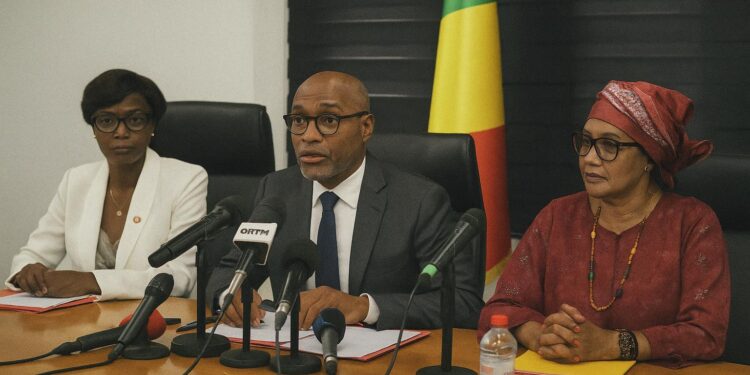A Subtle Pivot in Brazzaville’s Fiscal Narrative
Only a decade ago, revenue flows from Congolese crude and minerals were largely cloaked in administrative opacity. Today, the National Committee of the Extractive Industries Transparency Initiative convenes beneath the gilded ceilings of Brazzaville’s Ministry of Finance with a different agenda: codifying disclosure as statecraft. Chaired by Minister Christian Yoka on 24 July, the session signalled more than routine bureaucratic housekeeping. It underscored a recalibration of the Republic of the Congo’s economic self-presentation to international partners, creditors and rating agencies (EITI Board Communiqué, 2024).
EITI Compliance as a Strategic Imperative
The government’s decision to anticipate its 2025 reporting obligations by eighteen months betrays a keen awareness of shifting global capital preferences. Sovereign bond investors, already attentive to debt-to-GDP ratios that hover near 85 percent according to the IMF, increasingly attach premiums to verifiable governance metrics. By aligning domestic audits with EITI’s 2023 Standard, Brazzaville hopes to narrow its cost of borrowing and negotiate concessional windows with multilateral lenders. Officials close to the file argue that the transparency drive also inoculates the Treasury against commodity-price volatility: public scrutiny, they claim, disciplines budget execution and curbs extra-budgetary spending.
From Hydrocarbons to Hard Data: The Reform Panorama
Technically, the forthcoming report will capture fiscal year 2024 in granular detail, cross-matching company payments with Treasury receipts for hydrocarbons, iron ore and gold. Preparatory teams are already sieving through production sharing contracts and customs manifests to close the so-called reconciliation gap that previously stood at five percent of reported revenue. Digital registries, piloted with support from the African Development Bank, now trace cargoes from Pointe-Noire’s offshore terminals to refinery gates. While the system remains embryonic, early tests indicate a measurable diminution of invoice discrepancies, a development welcomed by civil-society delegates present at the July meeting.
Diplomacy of Disclosure and Investor Confidence
Transparency is not merely a technical exercise; it is a currency in diplomatic negotiation. Paris Club creditors and energy majors alike have praised Congo-Brazzaville’s willingness to publicise royalty flows, arguing that clarity reduces the perception of political risk (TotalEnergies Investor Brief, 2023). Regional neighbours watch attentively: Gabon’s recent suspension from EITI following political turbulence has amplified Brazzaville’s determination to showcase regulatory continuity. For President Denis Sassou Nguesso’s administration, disclosure provides a narrative of responsible stewardship that aligns with the African Union’s Agenda 2063 and reinforces Congo’s candidacy for climate finance linked to its vast forest carbon sinks.
Balancing Environmental Stewardship with Revenue Needs
Ministers Arlette Soudan-Nonault and Rosalie Matondo, guardians respectively of the environment portfolio and the Congolese rainforest, intervened to stress that extractive transparency must dovetail with ecological accountability. The concept of ‘double materiality’—whereby fiscal and environmental metrics are reported in tandem—has gained traction within the Committee. Pilot indicators now quantify methane intensity per barrel and reforestation spending per concession. Such innovations echo recommendations issued at last year’s COP28 side-event on Central African forestry, anchoring Congo’s ambition to monetise avoided deforestation without alienating energy investors.
Looking Ahead to the 2025 Validation Horizon
National Coordinator Florent Michel Mokoko candidly conceded that compliance gaps persist, notably in sub-national revenue transfers and beneficial-ownership disclosure. Yet the timeline is clear: twelve months to integrate corrective measures before the International Secretariat conducts its validation. Success could elevate Congo-Brazzaville’s status from ‘meaningful progress’ to ‘satisfactory progress’, a distinction that translates into lower sovereign-risk weightings. Failure, conversely, would not only strain donor relations but also complicate the government’s ongoing talks for budget-support tranches with the World Bank. This shared sense of urgency infused the July session with a rare cross-party consensus, bridging state officials, corporate executives and non-governmental auditors.
A Calculated Bet on Transparency
As the meeting adjourned, Minister Yoka summarised the stakes in terse diplomatic diction: ‘Transparency is no longer optional; it is the premium we pay for credibility.’ His remark captures the strategic wager underlying Brazzaville’s push: that the short-term administrative costs of exhaustive disclosure will be offset by cheaper capital, enhanced diplomatic leverage and a domestic polity more confident in fiscal governance. The months that follow will test this hypothesis in the unforgiving court of international markets, yet for now the Republic of the Congo projects the image of a state determined to illumine the corridors through which its mineral wealth flows.











































